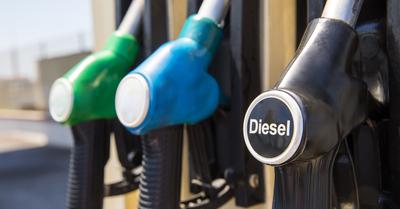If you are driving a diesel engine vehicle but worry about your environmental impact, diesel exhaust fluid might be exactly what you’re looking for.
Diesel Exhaust Fluid is a liquid additive for diesel engine vehicles to reduce pollution and carbon emissions. This aqueous urea solution is made of 67.5% deionized water and 32.5% urea to reduce harmful nitrogen oxide emissions. It has a one-year shelf life and doesn't impact fuel efficiency.
When it comes to diesel engines, one topic always sparks questions – Diesel Exhaust Fluid (DEF). If you've never heard of it or are unsure why it matters, I'm here to make it all make sense. By the end of this quick guide, you'll understand exactly what DEF is and how it helps keep our diesel engines running clean and green.
Key Takeaways
- Diesel Exhaust Fluid is a diesel engine additive that reduces pollution. It's made of 67.5% deionized water and 32.5% urea.
- The shelf life of Diesel Exhaust Fluid is one year.
- Diesel Exhaust Fluid is stored in a separate DEF tank, so it does not impact fuel efficiency or performance.
This article may contain affiliate links where we earn a commission from qualifying purchases.
What is Diesel Exhaust Fluid? A Quick Guide
Diesel Exhaust Fluid (DEF) is vital in keeping our diesel engines running clean and efficient. It's a solution of 67.5% deionized water and 32.5% urea that helps reduce harmful nitrogen oxide emissions produced by diesel engines.
When injected into the exhaust system, DEF breaks down these harmful gasses into harmless nitrogen and water vapor. DEF is now required in most modern diesel engines as part of the Selective Catalyst Reduction (SCR) system.
This helps meet stringent environmental regulations. SCR systems also typically use an exhaust gas recirculation design. It also doesn't compromise the fuel tank or fuel efficiency.
How Does It Work?
When injected into the exhaust stream, the urea breaks down, releasing ammonia. This ammonia reacts with the nitrogen oxides in the exhaust, converting them into nitrogen, carbon dioxide, and water through a catalytic process.
In the catalytic converter, the DEF meets the hot exhaust gas to create a chemical reaction in the DEF tanks. The result? Cleaner exhaust emissions and a happier planet.
Always follow the manufacturer's recommendations, and make sure to refill the DEF tank when needed. It's essential for the environment, ensures optimal performance, and prevents damage to the engine or the SCR system.
What Is Diesel Exhaust Fluid Made Of?
Diesel Exhaust Fluid consists of 32.5% urea and 67.5% deionized water.
Urea, a compound found in urine, might sound like a strange ingredient, but the urea used in DEF is a refined and pure form. When this aqueous urea solution is introduced into a diesel engine's exhaust system, it reduces harmful nitrogen oxide (NOx) emissions.
The heat from the exhaust breaks down the DEF solution into ammonia, which then reacts with NOx, turning it into harmless nitrogen gas and water. This process is crucial in meeting stringent emission standards and ensuring a healthier environment for everyone.
Why Do You Need Diesel Exhaust Fluid?
DEF is crucial for reducing harmful nitrogen oxide emissions from diesel engines. The exhaust heat breaks down this solution into ammonia, which reacts with nitrogen oxides (NOx), turning them into harmless nitrogen gas (N2) and water vapor (H2O).
It works like a Diesel Particulate Filter, but instead, it uses DEF rather than traditional diesel fuel. Nitrogen oxides, specifically nitrogen monoxide and nitrogen dioxide, are pollutants diesel engines produce.
These compounds contribute significantly to smog, respiratory issues, and acid rain. By using DEF in our diesel engine vehicles, we can actively participate in reducing pollution and improving air quality.
DEF works with selective catalytic reduction (SCR) technology, which reduces NOx emissions while maintaining engine performance levels. So not only do we help the environment, but our diesel vehicles remain efficient and powerful.
Do All Diesel Engines Require Diesel Exhaust Fluid?
No, not all diesel engines require DEF. Diesel Exhaust Fluid (DEF) is primarily used in modern
diesel engines equipped with Selective Catalytic Reduction (SCR) technology. SCR systems help reduce nitrogen oxide emissions, a common cause of smog and air pollution.
This solution is injected into the engine's exhaust stream, where it breaks down into ammonia and reacts with nitrogen oxides, turning them into harmless nitrogen and water vapor.
Most diesel-powered passenger cars and trucks built since 2010 have SCR systems and require DEF. However, not every diesel vehicle produced before 2010 is equipped with an SCR system, so they don't require DEF.
For diesel vehicles requiring DEF, it's essential to maintain proper DEF levels in the reservoir to ensure optimal performance and compliance with emission regulations.
What Happens When You Run Out of Diesel Exhaust Fluid?
When we run out of diesel exhaust fluid (DEF), our vehicle might experience unfavorable consequences. A warning from the vehicle's dashboard is one of the first signs of running low on DEF.
As the level dips below 10%, an amber warning light appears, followed by a flashing light at 5% and a solid warning light at 2.5%. Once the DEF runs out, our vehicle may slow down to a crawl, potentially damaging the DEF header.
Letting the vehicle consistently run out of DEF can eventually cause the entire exhaust system to fill with debris and soot. This reduces the vehicle's efficiency and may lead to a complete breakdown.
This mixture then travels into the selective catalytic reduction system, where it combines with oxygen and detrimental nitrogen oxides, producing nitrogen, water vapor, and carbon dioxide. Consequently, running out of DEF can disrupt this process and negatively impact our vehicle's emissions.
What Happens When Good Diesel Exhaust Fluid Goes Bad?
When DEF goes bad, its chemical composition may change, causing it not to break down nitrogen oxide emissions as efficiently. This can lead to increased emissions, which are harmful to the environment and can potentially cause your vehicle to fail emissions tests.
Additionally, using bad DEF can cause buildup and clogging in your vehicle's exhaust system, including the Selective Catalytic Reduction (SCR) system. This can negatively impact the performance of your diesel engine and cause it to operate less efficiently overall.
To avoid these issues, store DEF in a cool, dry place and check the expiration date before using it. Also, remember to monitor your vehicle's DEF levels and refill as necessary to maintain optimal engine performance.
What Is The Shelf Life of Diesel Exhaust Fluid?
First, it's essential to know that DEF has a shelf life of approximately one year, as it does not contain any preservatives. If stored improperly or for too long, DEF can deteriorate and lose effectiveness.
If you purchase DEF from a truck stop or auto parts store, it will have a clearly labeled expiry date. It's essential to avoid using DEF past this date, as it can lead to performance issues and potential maintenance problems.
It's also worth noting that the American Petroleum Institute (API) has announced a 12-month shelf life for diesel exhaust fluid. However, DEF manufacturers and wholesalers usually maximize the fluid's shelf life by storing it in a dry, cool, and adequately ventilated place.
Typically, it can be stored for up to one year without any issues. To ensure you're using fresh DEF, we recommend opting for bulk purchasing if you have a large fleet that requires frequent service.









